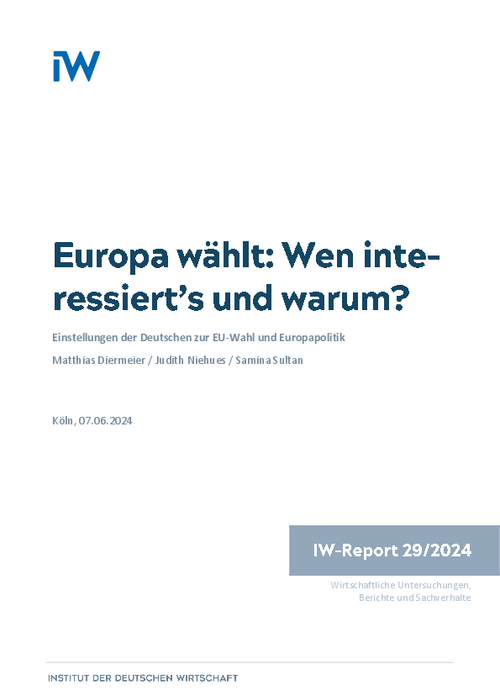This study, based on the IW-People Survey 2024, shows that around 62% of Germans consider the election of the European Parliament to be important. This is the result of around 5,200 respondents. The proportion is therefore roughly as high as the voter turnout in 2019.

Europe votes: Who cares and why?

This study, based on the IW-People Survey 2024, shows that around 62% of Germans consider the election of the European Parliament to be important. This is the result of around 5,200 respondents. The proportion is therefore roughly as high as the voter turnout in 2019.
The perception of this relevance can be increased by around 6 percentage points if respondents are informed about the influence of the European Union (EU) on German legislation, and even by around 8 percentage points if a specific law (abolition of roaming charges) is also mentioned. With information about the importance of the European single market for the German (export) economy, the perceived relevance of the European elections rises to just over 70%, an increase of 8.6 percentage points. If it is also pointed out that millions of German jobs are attributable to the European single market, the effect rises to 9.6 percentage points. The information has a positive effect on the significance of the European elections for all party supporters. It is noticeable that the economic arguments are particularly effective among FDP supporters, whereas the reference to the political weight of the EU catches on among supporters of the left. The findings suggest that the significance of the EU for both German legislation and the economy is underestimated. If this information reached eligible voters, it could increase the importance attributed to the European elections. This is relevant insofar as respondents are more likely to explicitly state that they do not want to vote in the European elections if they consider them to be unimportant. Conversely, providing targeted information about the influence of the EU could be conducive to increasing voter participation in the European elections. In order to confirm these findings, further research should focus on the long-term effect of information dissemination.
When asked about the future of the EU, a clear commitment to the EU emerges overall, but the survey results also reveal a certain resistance to change. There is a clear rejection (69%) of a “DEXIT”, but at the same time there is also no clear majority in favor of strengthening competencies, admitting additional member states or improving the EU's financial resources. A look at the party supporters shows the deep-rooted Euroscepticism of AfD supporters: they are the only ones (53%) to support a “DEXIT” and only a small proportion (13%) feel that they have a say in policy in Brussels. Although supporters of the Free Voters and the BSW are particularly critical of Germany's increased financial involvement in the EU, they also overwhelmingly reject an exit from the EU. The pro-European supporters of the Greens provide a contrast. Here too, however, there is no majority in favor of Germany making a greater financial contribution to the European budget.
In line with the large differences between the electorates, regression analyses show that political attitudes towards the controversial policy areas of migration, climate change, redistribution and Russia sanctions are important predictors of attitudes towards European integration. People who are in favor of more redistribution, a stronger climate policy, stricter Russia sanctions and a more liberal immigration policy are more likely to be in the pro-integration camp. In terms of socio-demographic characteristics, older people, people from rural areas and people from lower social classes are less likely to be in favor of strengthening the EU. In principle, however, the socio-demographic characteristics make a noticeably smaller contribution to explaining the observed variance in attitudes towards European policy than subjective assessments of economic development, democracy and the policy areas surveyed.

Europe votes: Who cares and why?

More on the topic
Not so Different?: Dependency of the German and Italian Industry on China Intermediate Inputs
On average the German and Italian industry display a very similar intermediate input dependence on China, whether accounting for domestic inputs or not.
IW
China’s Trade Surplus – Implications for the World and for Europe
China’s merchandise trade surplus has reached an all-time high and is likely to rise further. A key driver appears to be a policy push to further bolster Chinese domestic manufacturing production, implying the danger of significant overcapacities.
IW